Unit 11 How was your school trip? Section A 2a-2d课件(共有PPT27张)
文档属性
| 名称 | Unit 11 How was your school trip? Section A 2a-2d课件(共有PPT27张) | 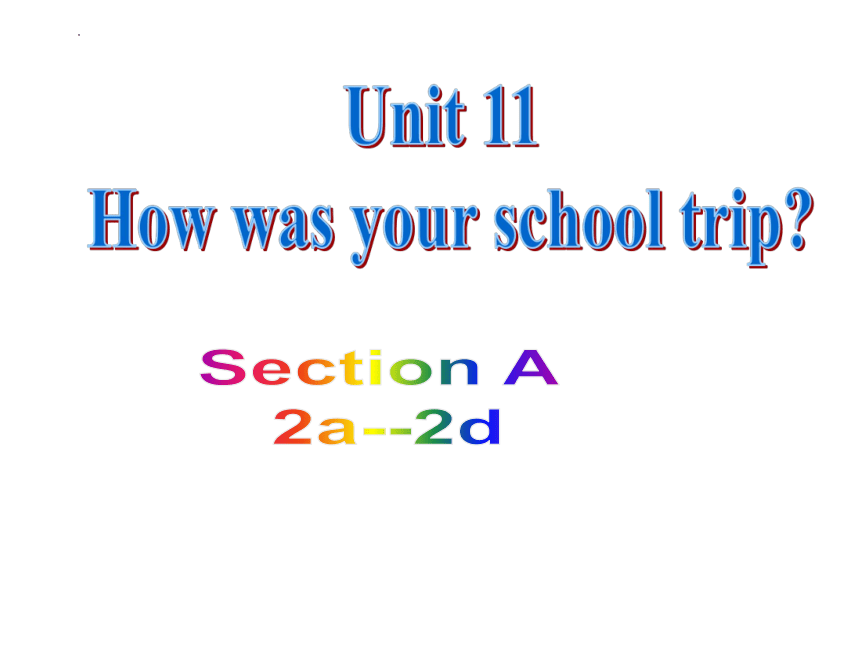 | |
| 格式 | pptx | ||
| 文件大小 | 3.3MB | ||
| 资源类型 | 教案 | ||
| 版本资源 | 人教新目标(Go for it)版 | ||
| 科目 | 英语 | ||
| 更新时间 | 2022-04-06 17:49:07 | ||
图片预览

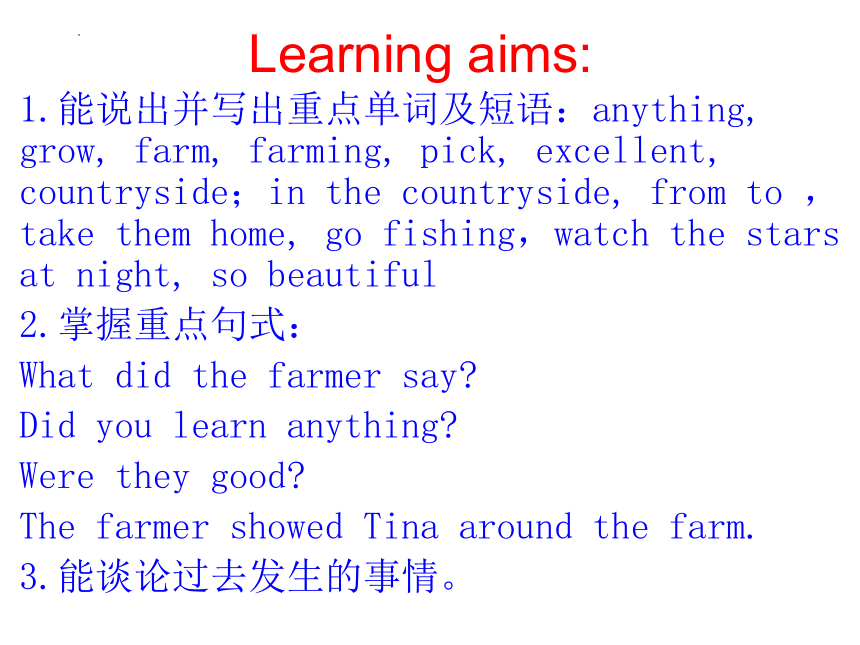
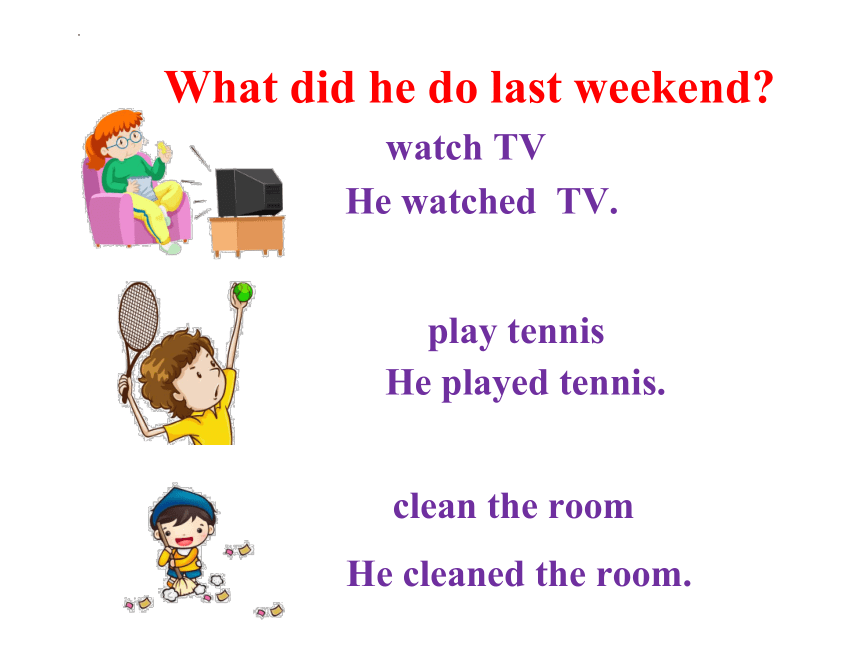
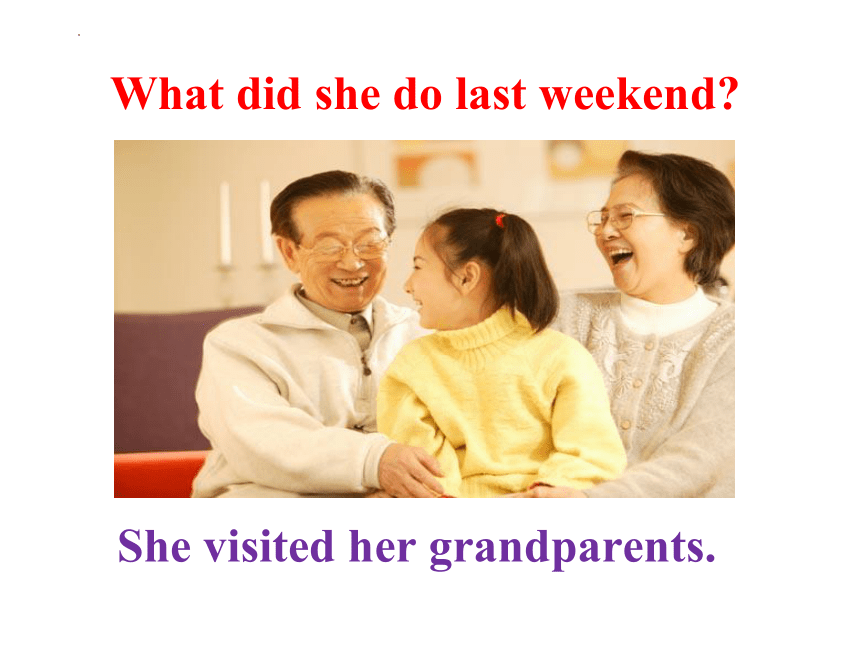
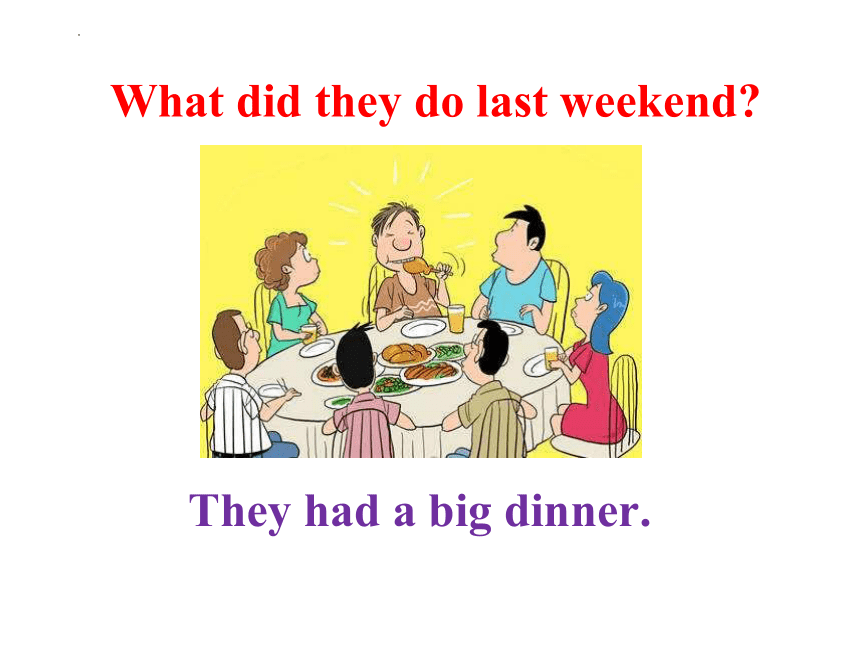
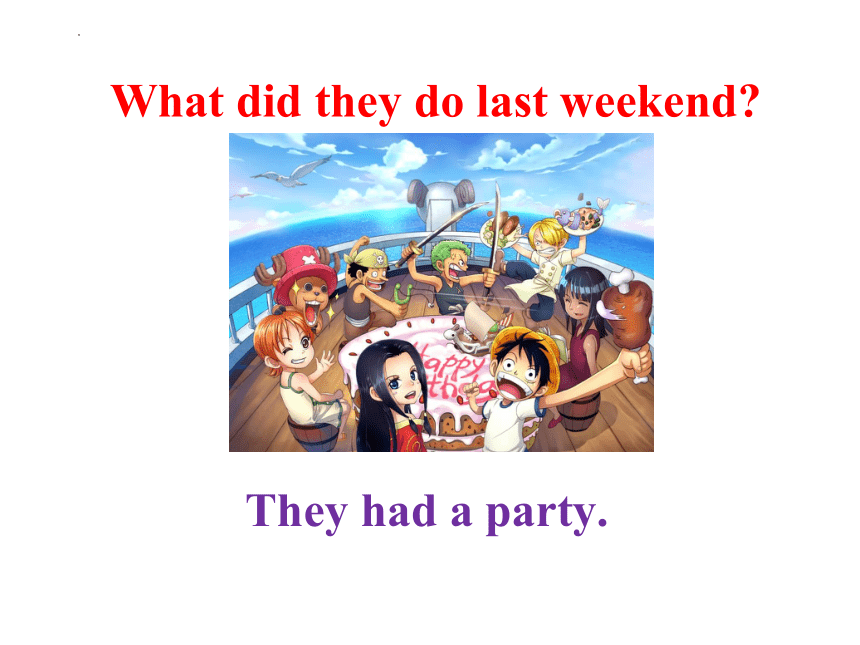
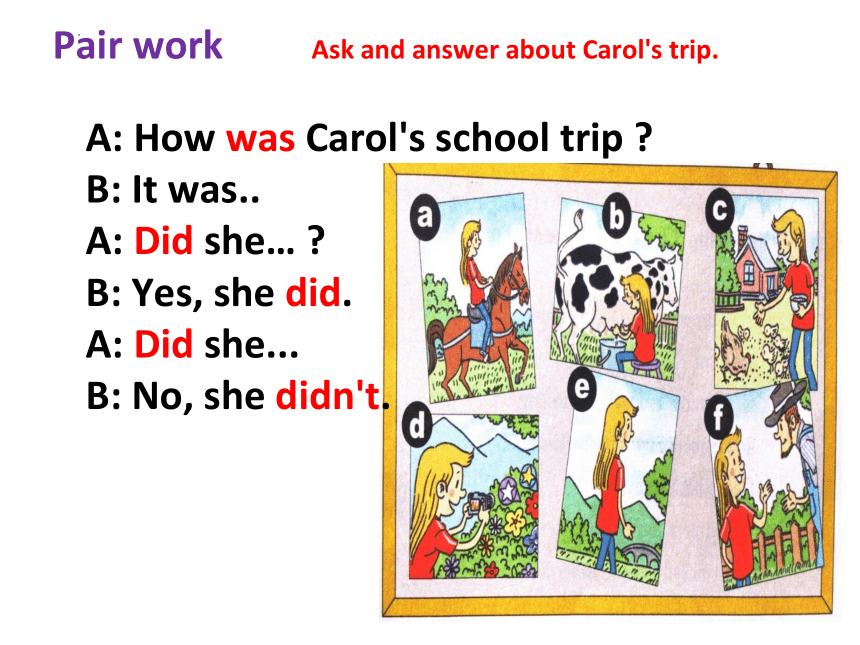
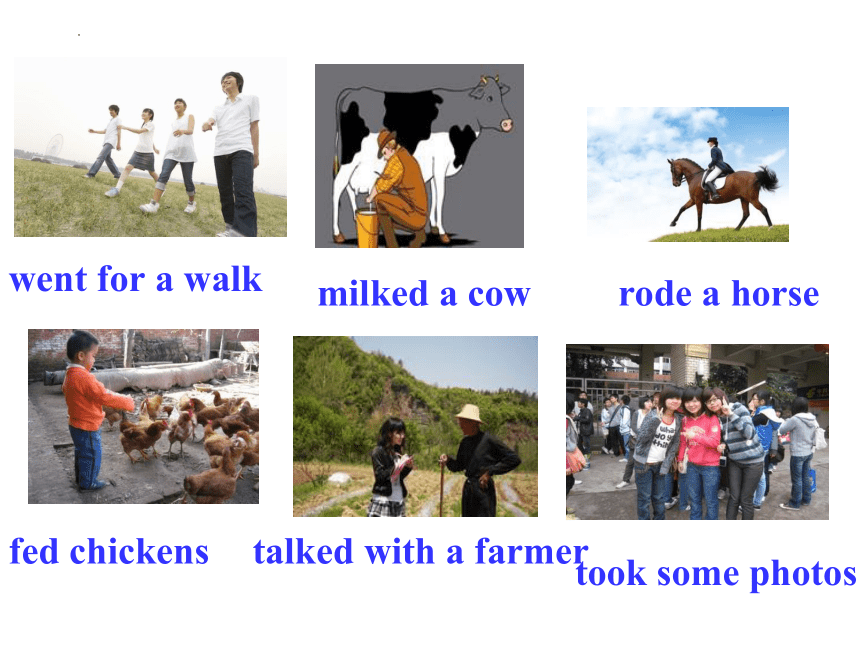
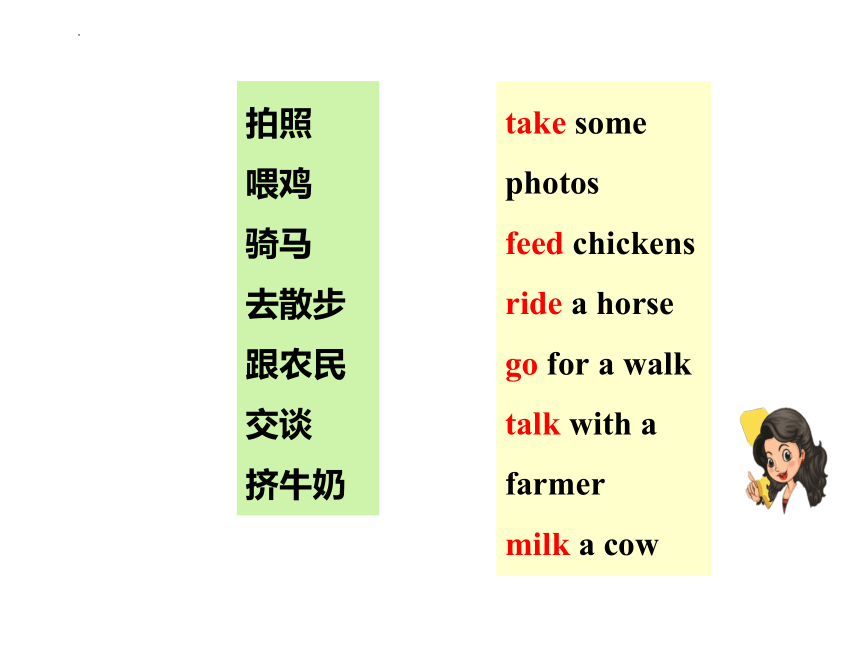
文档简介
(共27张PPT)
Section A
2a--2d
Unit 11
How was your school trip
Learning aims:
1.能说出并写出重点单词及短语:anything, grow, farm, farming, pick, excellent, countryside;in the countryside, from to , take them home, go fishing,watch the stars at night, so beautiful
2.掌握重点句式:
What did the farmer say
Did you learn anything
Were they good
The farmer showed Tina around the farm.
3.能谈论过去发生的事情。
He cleaned the room.
He played tennis.
He watched TV.
play tennis
watch TV
clean the room
What did he do last weekend
What did she do last weekend
She visited her grandparents.
What did they do last weekend
They had a big dinner.
What did they do last weekend
They had a party.
Pair work
Ask and answer about Carol's trip.
A: How was Carol's school trip
B: It was..
A: Did she…
B: Yes, she did.
A: Did she...
B: No, she didn't.
took some photos
went for a walk
milked a cow
rode a horse
fed chickens
talked with a farmer
take some photos
feed chickens
ride a horse
go for a walk
talk with a farmer
milk a cow
拍照
喂鸡
骑马
去散步
跟农民交谈
挤牛奶
New words and expressions
anything
grow
farm
pick
excellent
countryside
in the countryside
任何东西,任何事物
种植,生长,发育
n. 农场 v. 务农,种田
采,摘
极好的,优秀的
乡村,农村
在乡下,在农村
Match the phrases with the pictures.
went for a walk milked a cow
rode a horse fed chickens
talked with a farmer took some photos
e
b
a
c
f
d
2a
Listen and check ( ) the questions
you hear.
___ What did the farmer say
___ Did you grow any apples
___ What did you see
___ Do they grow apples
___ Did you learn anything
___ Did you eat them
___ Did you ask him any questions ___ Were they good
2b
Listen again. Circle T for true or F for false.
1. The farmer showed Carol around
the farm. T F
2. Carol learned a lot about farming. T F
3. The farmers grow strawberries from
December to June. T F
4. The farmers don’t grow apples. T F
5. Carol picked some strawberries
and took them home. T F
show sb. around 带(某人)参观
2c Ask and answer questions about
Carol’s visit to the farm.
A: What did Carol do
B: She picked some strawberries.
Speaking
Read the conversation in 2d and answer the following questions.
1. Where did Eric go last weekend
2. Why did he go there
3. What did he do
4. How was the weather there
5. What did he do at night
6. How did Eric feel about the trip
He went to the countryside.
He visited his grandparents.
He went fishing and fed the chickens.
It was great and the air was so clean.
He watched the stars.
It was excellent.
Peter: Hi, Eric. How was your trip last week
Eric: It was excellent. I visited my grandparents in the countryside.
Peter : Oh, nice. What did you do
Eric : I went fishing every day. And I fed the chickens with my grandpa. It was so much fun.
Peter : Sounds good. How was the weather there
Eric : It was great, and the air was so clean. I watched the stars at night. They were so beautiful.
Peter : Lucky you.
2d
Role-play the conversation.
上周
在乡下
go fishing去钓鱼
每天
feed … with …词组表示“用……喂……”
sound为系动词,表示“听起来……”其后加形容词。同样用法的单词还有feel, taste, smell, look 等等,表示“摸,尝,闻,看……起来”。
空气是如此干净
在晚上
你真幸运!
fun表示“有趣的事情”,为不可数名词。
Peter: Hi, Eric. _______ was your trip last week
Eric: It was exxellent. I _______ my grandparents in the countryside.
Peter: Oh, nice. What _______ you do
Eric: I ___________ every day. And I fed the chickens with my grandapa. It was so much fun.
Peter: _____________. How was the weather there
Eric: It was great and the air was so clean. I _________________ at night. They were so beautiful.
Peter: Lucky you.
2d. Role-play conversation.
How
visited
did
went fishing
Sounds good
watched the stars
show sb. around 动词短语,意为“带领某人参观”。此处show作及物动词。
e.g.: Can you show me around your new school 你能带我参观一下你们的新学校吗?
1. The farmer showed Carol around the farm. 农场主带卡萝尔参观了农场。
Language Points
【拓展】show用作及物动词的主要用法:
(1)意为“给……看;出示;显示”,常用结构为show sb. sth. 或 show sth. to sb.。
e.g.:Please show me that coat.=Please show that coat
to me.请把那件外套拿给我看看。
You have a new pen. Please show it to me.
你有一支新钢笔,请给我看看。
(2)意为“(向人)说明;表明;指示;放映;展出”等。
e.g.:Your homework shows that you are very careful.
从你的作业上可以看出你很认真。
Show me the way, please.请给我指路。
(1)How + be… 意为“……怎么样?”可与“What be … like ”互换。
e.g.: How was your summer vacation = What was your summer vacation like 你的暑假过得怎样?
2. How was your trip last week 你上周的旅行怎么样?
(2) trip名词,意为“郊游;旅行”,通常指近距离、某次具体的旅行。
e.g.: Have a good trip! 旅途愉快!
3.Did you grow any apples 你种植一些苹果了吗?(教材第62页)
grow此处用作及物动词,意为“种植;栽培”,其后可直接接名词或代词作宾语。
e.g.:We grow flowers and vegetables in our garden.
我们在花园里种植鲜花和蔬菜。
【拓展】(1)grow可用作不及物动词,意为“生长;发育”。
e.g.:In spring, everything begins to grow.
春天万物复苏。
How quickly the baby is growing!
这个婴儿长得多么快啊!
(2)grow可用作连系动词,有“逐渐变得”之意,强调变化过程。
e.g.:It's growing dark.天渐渐(变)黑了。
(3)grow up意为“长大;成长”。
e.g.:What do you want to be when you grow up
你长大后想当什么?
4.It was so much fun.那真是挺好玩的。(教材第62页)
(1)so much意为“如此多;这么多”,一般用于修饰不可数名词或动词。
e.g.:There was so much noise in the classroom.
教室里太吵了。
You talked so much.你说得太多了。
【拓展】so many “这么多;如此多”,常用来修饰可数名词复数。
e.g.:He had so many friends in the city.
在这个城市里,他有这么多朋友。
(2)fun此处用作不可数名词,意为“乐趣;开心;有趣的人或事”,其前常用great,much,a lot of等修饰,用来加强语气。
e.g.:He's great fun, and his dog is great fun, too.
他是个有趣的人,他的狗也很有趣。
Skating is great fun.
滑冰是件很有趣的事。
一、单项选择。
( )1.—____ did she ____ last Monday
—She watched TV.
A.What;do B.When;do C.What;did D.When;did
( )2.—How ____ your weekend
—It ____ great. I____ tired now.
A.was;was;am B.was;was;was
C.is;is;was D.is;is;am
( )3. I learned a lot about farming ____ week .
A. last B.next C. for D.in
A
A
A
Exercise
( )4.I went to Beijing to visit my grandparents last week, and they showed me____ the city.
A.around B.to
C.in D.about
( )5.He is short of money this week,so he didn’t buy ____.
A.nothing B.anything
C.something D.everything
A
B
二、句型转换。
1.The bus trip was very relaxing.(对画线部分提问)
____ ____ the bus trip
2.Carol rides a horse every week.(用last week改写句子)
Carol ______ ____ ______ last week.
3.I took some photos last summer.(改为一般疑问句)
____ you _____ _____ photos last summer
4.We went to the countryside this summer.(对画线部分提问)
_____ ____ you do this summer
How was
rode a horse
Did take any
What did
Section A
2a--2d
Unit 11
How was your school trip
Learning aims:
1.能说出并写出重点单词及短语:anything, grow, farm, farming, pick, excellent, countryside;in the countryside, from to , take them home, go fishing,watch the stars at night, so beautiful
2.掌握重点句式:
What did the farmer say
Did you learn anything
Were they good
The farmer showed Tina around the farm.
3.能谈论过去发生的事情。
He cleaned the room.
He played tennis.
He watched TV.
play tennis
watch TV
clean the room
What did he do last weekend
What did she do last weekend
She visited her grandparents.
What did they do last weekend
They had a big dinner.
What did they do last weekend
They had a party.
Pair work
Ask and answer about Carol's trip.
A: How was Carol's school trip
B: It was..
A: Did she…
B: Yes, she did.
A: Did she...
B: No, she didn't.
took some photos
went for a walk
milked a cow
rode a horse
fed chickens
talked with a farmer
take some photos
feed chickens
ride a horse
go for a walk
talk with a farmer
milk a cow
拍照
喂鸡
骑马
去散步
跟农民交谈
挤牛奶
New words and expressions
anything
grow
farm
pick
excellent
countryside
in the countryside
任何东西,任何事物
种植,生长,发育
n. 农场 v. 务农,种田
采,摘
极好的,优秀的
乡村,农村
在乡下,在农村
Match the phrases with the pictures.
went for a walk milked a cow
rode a horse fed chickens
talked with a farmer took some photos
e
b
a
c
f
d
2a
Listen and check ( ) the questions
you hear.
___ What did the farmer say
___ Did you grow any apples
___ What did you see
___ Do they grow apples
___ Did you learn anything
___ Did you eat them
___ Did you ask him any questions ___ Were they good
2b
Listen again. Circle T for true or F for false.
1. The farmer showed Carol around
the farm. T F
2. Carol learned a lot about farming. T F
3. The farmers grow strawberries from
December to June. T F
4. The farmers don’t grow apples. T F
5. Carol picked some strawberries
and took them home. T F
show sb. around 带(某人)参观
2c Ask and answer questions about
Carol’s visit to the farm.
A: What did Carol do
B: She picked some strawberries.
Speaking
Read the conversation in 2d and answer the following questions.
1. Where did Eric go last weekend
2. Why did he go there
3. What did he do
4. How was the weather there
5. What did he do at night
6. How did Eric feel about the trip
He went to the countryside.
He visited his grandparents.
He went fishing and fed the chickens.
It was great and the air was so clean.
He watched the stars.
It was excellent.
Peter: Hi, Eric. How was your trip last week
Eric: It was excellent. I visited my grandparents in the countryside.
Peter : Oh, nice. What did you do
Eric : I went fishing every day. And I fed the chickens with my grandpa. It was so much fun.
Peter : Sounds good. How was the weather there
Eric : It was great, and the air was so clean. I watched the stars at night. They were so beautiful.
Peter : Lucky you.
2d
Role-play the conversation.
上周
在乡下
go fishing去钓鱼
每天
feed … with …词组表示“用……喂……”
sound为系动词,表示“听起来……”其后加形容词。同样用法的单词还有feel, taste, smell, look 等等,表示“摸,尝,闻,看……起来”。
空气是如此干净
在晚上
你真幸运!
fun表示“有趣的事情”,为不可数名词。
Peter: Hi, Eric. _______ was your trip last week
Eric: It was exxellent. I _______ my grandparents in the countryside.
Peter: Oh, nice. What _______ you do
Eric: I ___________ every day. And I fed the chickens with my grandapa. It was so much fun.
Peter: _____________. How was the weather there
Eric: It was great and the air was so clean. I _________________ at night. They were so beautiful.
Peter: Lucky you.
2d. Role-play conversation.
How
visited
did
went fishing
Sounds good
watched the stars
show sb. around 动词短语,意为“带领某人参观”。此处show作及物动词。
e.g.: Can you show me around your new school 你能带我参观一下你们的新学校吗?
1. The farmer showed Carol around the farm. 农场主带卡萝尔参观了农场。
Language Points
【拓展】show用作及物动词的主要用法:
(1)意为“给……看;出示;显示”,常用结构为show sb. sth. 或 show sth. to sb.。
e.g.:Please show me that coat.=Please show that coat
to me.请把那件外套拿给我看看。
You have a new pen. Please show it to me.
你有一支新钢笔,请给我看看。
(2)意为“(向人)说明;表明;指示;放映;展出”等。
e.g.:Your homework shows that you are very careful.
从你的作业上可以看出你很认真。
Show me the way, please.请给我指路。
(1)How + be… 意为“……怎么样?”可与“What be … like ”互换。
e.g.: How was your summer vacation = What was your summer vacation like 你的暑假过得怎样?
2. How was your trip last week 你上周的旅行怎么样?
(2) trip名词,意为“郊游;旅行”,通常指近距离、某次具体的旅行。
e.g.: Have a good trip! 旅途愉快!
3.Did you grow any apples 你种植一些苹果了吗?(教材第62页)
grow此处用作及物动词,意为“种植;栽培”,其后可直接接名词或代词作宾语。
e.g.:We grow flowers and vegetables in our garden.
我们在花园里种植鲜花和蔬菜。
【拓展】(1)grow可用作不及物动词,意为“生长;发育”。
e.g.:In spring, everything begins to grow.
春天万物复苏。
How quickly the baby is growing!
这个婴儿长得多么快啊!
(2)grow可用作连系动词,有“逐渐变得”之意,强调变化过程。
e.g.:It's growing dark.天渐渐(变)黑了。
(3)grow up意为“长大;成长”。
e.g.:What do you want to be when you grow up
你长大后想当什么?
4.It was so much fun.那真是挺好玩的。(教材第62页)
(1)so much意为“如此多;这么多”,一般用于修饰不可数名词或动词。
e.g.:There was so much noise in the classroom.
教室里太吵了。
You talked so much.你说得太多了。
【拓展】so many “这么多;如此多”,常用来修饰可数名词复数。
e.g.:He had so many friends in the city.
在这个城市里,他有这么多朋友。
(2)fun此处用作不可数名词,意为“乐趣;开心;有趣的人或事”,其前常用great,much,a lot of等修饰,用来加强语气。
e.g.:He's great fun, and his dog is great fun, too.
他是个有趣的人,他的狗也很有趣。
Skating is great fun.
滑冰是件很有趣的事。
一、单项选择。
( )1.—____ did she ____ last Monday
—She watched TV.
A.What;do B.When;do C.What;did D.When;did
( )2.—How ____ your weekend
—It ____ great. I____ tired now.
A.was;was;am B.was;was;was
C.is;is;was D.is;is;am
( )3. I learned a lot about farming ____ week .
A. last B.next C. for D.in
A
A
A
Exercise
( )4.I went to Beijing to visit my grandparents last week, and they showed me____ the city.
A.around B.to
C.in D.about
( )5.He is short of money this week,so he didn’t buy ____.
A.nothing B.anything
C.something D.everything
A
B
二、句型转换。
1.The bus trip was very relaxing.(对画线部分提问)
____ ____ the bus trip
2.Carol rides a horse every week.(用last week改写句子)
Carol ______ ____ ______ last week.
3.I took some photos last summer.(改为一般疑问句)
____ you _____ _____ photos last summer
4.We went to the countryside this summer.(对画线部分提问)
_____ ____ you do this summer
How was
rode a horse
Did take any
What did
同课章节目录
- Unit 1 Can you play the guitar?
- Section A
- Section B
- Unit 2 What time do you go to school?
- Section A
- Section B
- Unit 3 How do you get to school?
- Section A
- Section B
- Unit 4 Don't eat in class.
- Section A
- Section B
- Unit 5 Why do you like pandas?
- Section A
- Section B
- Unit 6 I'm watching TV.
- Section A
- Section B
- Review of Units 1-6
- Unit 7 It's raining!
- Section A
- Section B
- Unit 8 Is there a post office near here?
- Section A
- Section B
- Unit 9 What does he look like?
- Section A
- Section B
- Unit 10 I'd like some noodles.
- Section A
- Section B
- Unit 11 How was your school trip?
- Section A
- Section B
- Unit 12 What did you do last weekend?
- Section A
- Section B
